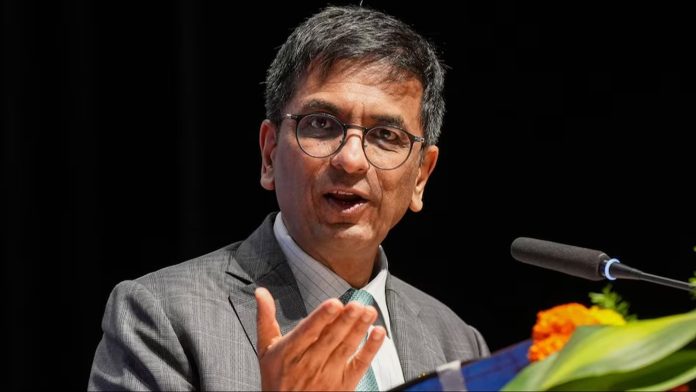New Delhi, Aug 5: The legal system must evolve according to technological advances and the courts must embrace the “unstoppable” march of technology to enhance accessibility and efficiency, Chief Justice of India (CJI) D Y Chandrachud said on Monday.
The CJI was speaking at the launch of Delhi High Court’s ‘Digital Law Reports’, which, he said was a “powerful platform for the digital publication of judgments of public importance” and would democratise the dissemination of legal knowledge.
“As technology advances, the legal system must evolve accordingly. Lawyers and litigants relying on electronic tools cannot be asked to revert to outdated paper systems. The march of technology is unstoppable, and our courts must embrace these changes to enhance accessibility and efficiency,” he said.
He also urged everyone to “support and advocate these transformative changes to ensure that justice remains within reach for everyone”.
The launch of ‘Digital Law Reports of Delhi High Court’ was attended by several dignitaries, including Supreme Court Judge Abhay S Oka and the high court’s Acting Chief Justice Manmohan, apart from other judges.
CJI Chandrachud hailed the high court’s initiative and said it would not only act as a “treasured resource” for legal professionals and researchers as it offers a comprehensive repository of valuable judgments, but also reaffirm the commitment to “swift, accessible, and fair-minded” justice.
“By lowering barriers to accessing essential legal information, the portal supports a diverse range of individuals entering the legal profession, not just law graduates, but professionals from other fields as well,” he said.
He also inaugurated a restaurant in the high court campus, which will be run by neuro-divergent persons, and said he has turned vegan in support of a “cruelty-free” life.
“I have two daughters who are specially-abled and they continue to inspire me… I have gone vegan recently because my daughter said we should lead a cruelty-free life. I don’t buy any silk product or any new leather product. My wife doesn’t buy any silk or leather products either,” he said.
The CJI also spoke about the top court’s ‘E-Supreme Court Reports’ portal on the occasion.
“The Supreme Court’s E-SCR Portal currently hosts approximately 36,802 reported judgments. Additionally, these judgments have been translated into several languages to further enhance accessibility — Hindi (36,280), Punjabi (10,199), Tamil (2,401), and Marathi (2,364),” he stated.
“This multilingual approach ensures that legal information is accessible to a broader audience, reflecting our commitment to inclusivity,” he added.
The apex court judge also said digital transformation aligns with the United Nations’ Sustainable Development Goals with respect to minimising the environmental impact of our legal processes.
“Each digital file saves a tree, and each online submission reduces our carbon footprint. This initiative reflects our responsibility to protect the environment for future generations. I recall a time when thousands of pages were required to register a single case, an approach that was both labour-intensive and unsustainable,” he said.
“Each technological advancement, including the E-DHCR portal, plays a crucial role in building a more accessible and efficient justice system,” the CJI said.
CJI Chandrachud also spoke on a recent decision of his bench on the issue of exorbitant fees previously charged by state bar councils. This decision, he said, highlights the critical importance of accessibility in the legal profession.
“Dignity is crucial to substantive equality. The dignity of an individual encompasses the right to develop their potential to the fullest. The right to pursue a profession of one’s choice and earn a livelihood is integral to an individual’s dignity. Ensuring affordable access to the legal profession reinforces the principle that justice must be accessible to all,” the CJI said. (PTI)
Trending Now
E-Paper


